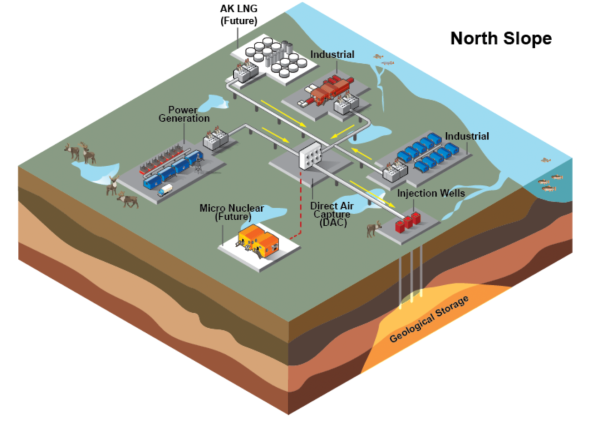
The pressure to reduce carbon emissions is forcing a major shift in the oil industry. Australian oil company Santos is taking a bold step with its new Alaskan development, the Pikka oil field, which they claim will be "climate-friendly."

>> In Other News: ATCO EnPower, Shell Move Forward with Atlas Carbon Storage Hub Project
Santos in Alaska: A New Player on the North Slope
Santos, a well-established Australian oil and gas company, is entering the Alaskan scene with the Pikka project. This significant development on Alaska's North Slope holds the potential to reshape the state's oil industry.
Strategies for Decarbonization: Beyond Offsets
Santos' approach goes beyond the typical industry practice of carbon offsets, which involve investing in projects that reduce carbon elsewhere to compensate for emissions produced. Their plan incorporates two innovative strategies:
Carbon Capture and Storage (CCS): Santos aims to capture emissions directly from North Slope power plants and drill pads. They also plan to explore "direct air capture," a new technology that sucks carbon dioxide out of the air. The captured carbon would then be safely stored underground.
Offsets: Santos acknowledges the role of offsets in achieving net-zero emissions. They might invest in projects like reforestation or renewable energy initiatives to compensate for the emissions generated by burning the extracted oil.
Impact on Alaska's Oil Industry
Santos' commitment to decarbonization stands in contrast to the practices of established Alaskan oil companies like ConocoPhillips. This could influence future regulatory policies and public perception within the state. The potential economic benefits include job creation in new technology sectors and a more sustainable long-term future for Alaska's oil industry.

Broader Implications for Global Carbon Reduction
Santos' strategies align with the goals of the Paris Agreement, a landmark international treaty on climate change. Their success could inspire other oil companies to adopt similar practices. However, the scalability of CCS and offsets as solutions for large-scale carbon reduction remains a question.
Challenges and Skepticism
Concerns exist regarding the cost-effectiveness and technological feasibility of CCS and direct air capture. Environmental groups criticize these technologies as a potential delay tactic for transitioning away from fossil fuels altogether. Transparency and accountability are crucial to address concerns about "greenwashing," a tactic where companies create a misleading impression of environmental responsibility.
A Promising Step Towards a Sustainable Future
Santos' innovative approach to decarbonization in Alaska represents a significant step forward. While challenges remain, their efforts hold promise for positive impacts on both local and global scales. Continued investment in research and development of these technologies is crucial for a future where the oil industry can coexist with a healthy planet.
Subscribe to the newsletter
Daily decarbonization data and news delivered to your inbox
Follow the money flow of climate, technology, and energy investments to uncover new opportunities and jobs.
Latest issues
-
This $4.1M Deal Could Change Carbon Capture's Playbook
Inside This Issue 🗜️ CarbonQuest Lands $4.1M Alberta Deal on Gas Compressors 🛡️ CADO, 123Carbon, and Assure SAF Registry Join Forces to Tackle SAF Integrity Gaps ✈️ ISCC, OMV, and Airbus Partner t...
-
Can Koloma Crack Iowa's Billion-Year-Old Secret?
Inside This Issue ⛏️ Iowa's Hydrogen Rush: Can Koloma Strike Gold Before Rules Kick In? ✈️ Bentley Commits to Use 100% Sustainable Aviation Fuel for Car Airfreight 🌬️ Minister Parrott Provides Upd...
-
$47M Just Poured Into This SAF Producer
Inside This Issue 💰 LanzaJet Announces $47M in New Capital and First Close of Equity Round at $650M Pre-Money Valuation 🚢 Maersk's Ethanol Bet Could Reshape U.S. Fuel Markets 🪨 Canada Nickel and t...
Company Announcements
-
Feedstocks are Perennial Grasses and other Renewable Biomass Sources FREDERICK, Md., Feb. 18, 2026 /PRNewswire/ -- Do you know why passenger and freight planes are not using renewable biofuel? It'...
-
Vancouver, British Columbia--(Newsfile Corp. - February 25, 2026) - Q Precious & Battery Metals Corp. (CSE: QMET) (OTC Pink: BTKRF) (FSE: 0NB) ("QMET" or the "Company") congratulates Quebec Inn...
-
Carbon Direct and C2X Announce Collaboration on Pioneering Forestry Residue-to-Biofuel Project
Collaboration on C2X’s Beaver Lake Biofuels project advances biomass carbon removal and storage as a scalable climate solution, transforming Louisiana’s forestry and sawmill residues into biofuel a...
-
Carbon Direct and C2X Announce Collaboration on Pioneering Forestry Residue-to-Biofuel Project
Collaboration on C2X’s Beaver Lake Biofuels project advances biomass carbon removal and storage as a scalable climate solution, transforming Louisiana’s forestry and sawmill residues into biofuel a...